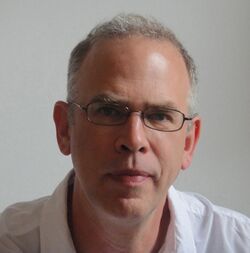Biography:James Brusseau

James Brusseau is a philosopher specializing in contemporary Continental philosophy, history of philosophy and ethics.[1] In 1994 Brusseau joined the faculty of Philosophy and Letters at the Mexican National University in Mexico City teaching graduate courses in philosophy and comparative literature. He has also taught in Europe and the California State University. Currently he teaches at Pace University in New York City.[2] Brusseau took a Ph.D. in Philosophy under the direction of Alphonso Lingis He is currently a professor at Pace University in New York City. He is married to a Spaniard and has two children.
Scholarship
Brusseau's scholarship focuses on philosophical decadence, which he defines as philosophers stepping aside from the task of making accurate theories about the larger world, and instead endeavoring to produce theories that in their turn provoke more theorizing. Within this framework, whether a philosopher is actually right about things becomes a secondary or derivative concern. The guiding purpose is to provoke more strictly philosophical discussion and study. As a result, the best philosophical idea directly equals the one producing the most subsequent philosophizing.
Brusseau attempts to locate decadence in the history of philosophy at Friedrich Nietzsche’s appropriation by recent French philosophers including Michel Foucault, Gilles Deleuze and Jacques Derrida. He calls the moment a “reversal” in philosophy’s history, one where thought no longer exists to pursue truth, instead, truths exist to serve and accelerate thinking.[3]
It is unclear from Brusseau’s published work and lectures whether he considers this development to be negative, neutral or positive.
Philosophical and applied ethics
Brusseau’s academic research in philosophical ethics explores the human experience of artificial intelligence in the areas of privacy, freedom, authenticity, and personal identity [4] In the area of applied ethics, one study employs natural language processing to generate ethical evaluations of companies that function with artificial intelligence at the core of their operation,[5][6] effectively using AI to apply AI ethics to AI.[7]
In Business Ethics Workshop,[8] Brusseau focuses on philosophical approaches to the corporation’s role in society, and ethical questions arising around branding and the creation of product reputation. The fabrication of consumer needs and consumer identity is also considered.[9]
Brusseau's Dignity, Pleasures, Vulgarity: Philosophy and Animal Rights[10] asks how animal studies reflect back to reveal human truths.[11]
The documentary Wealth Inequality Workshop[12] unites utilitarianism, Rawls, Nozick, Bataille and Deleuze to explore theoretical dilemmas of wealth inequality. Brusseau argues that the philosophies of Bataille and Deleuze can be mobilized both to allow and limit wealth inequality.[13][14]
Books
- Isolated Experiences, State University of New York Press, 1996
- Decadence of the French Nietzsche, Rowman & Littlefield, 2004
- Empire of Humiliation, Overflow, 2008
- Business Ethics Workshop, Flat World Knowledge, 2011
- Ethics Workshop, Flat World Knowledge, 2015
- Dignity, Pleasures, Vulgarity: Philosophy + Animal Rights, Overflow, 2016
External links
References
- ↑ "Isolated Experiences". http://www.sunypress.edu/p-2706-isolated-experiences.aspx.
- ↑ "James Brusseau, Department of Philosophy - Pace University ePortfolio". https://eportfolio.pace.edu/user/view.php?id=13707.
- ↑ Decadence of the French Nietzsche. https://rowman.com/ISBN/9780739109434.
- ↑ James Brusseau (2019-05-29). "What to Do When Privacy Is Gone". Computer Ethics - Philosophical Enquiry (Cepe) Proceedings (Old Dominion University) 2019 (1). doi:10.25884/798y-hr54. https://digitalcommons.odu.edu/cepe_proceedings/vol2019/iss1/1/. Retrieved 2021-09-21.
- ↑ "James Brusseau author biography". Skytop Strategies. https://skytopstrategies.com/authors/532.
- ↑ James Brusseau (2021-06-01). "AI human impact: toward a model for ethical investing in AI-intensive companies". Journal of Sustainable Finance & Investment: 1–28. doi:10.1080/20430795.2021.1874212. https://www.tandfonline.com/doi/abs/10.1080/20430795.2021.1874212. Retrieved 2021-09-11.
- ↑ "AI Ethics Decentralised and Accelerated". The United Nations Educational, Scientific and Cultural Organization (UNESCO). 2021-09-28. https://en.unesco.org/news/2nd-annual-artificial-intelligence-information-accessibility-conference-highlights.
- ↑ "James Brusseau's The Business Ethics Workshop and Flat World Knowledge". http://www.flatworldknowledge.com//node/233286.
- ↑ "James Brusseau's The Business Ethics Workshop and Flat World Knowledge | Flat World Knowledge". http://www.flatworldknowledge.com/Brusseau-Podcast.
- ↑ Heritage Radio, http://heritageradionetwork.org/podcast/dignity-pleasures-vulgarity-philosophy-and-animal-rights/
- ↑ KTEP/NPR, http://ktep.org/post/act-radio-james-brusseau
- ↑ "Wealth Inequality Workshop: Philosophy and Ethics of Wealth Distribution - Pace University ePortfolio". https://eportfolio.pace.edu/view/view.php?id=111964.
- ↑ "089: James Brusseau on Wealth Inequality and the Accursed Share". 9 June 2016. http://www.economicrockstar.com/jamesbrusseau/.
- ↑ "Dr. James Brusseau on Inequality & Philosophy". 20 June 2016. https://imhoppingmad.com/2016/06/20/dr-james-brusseau-on-inequality-philosophy/.
